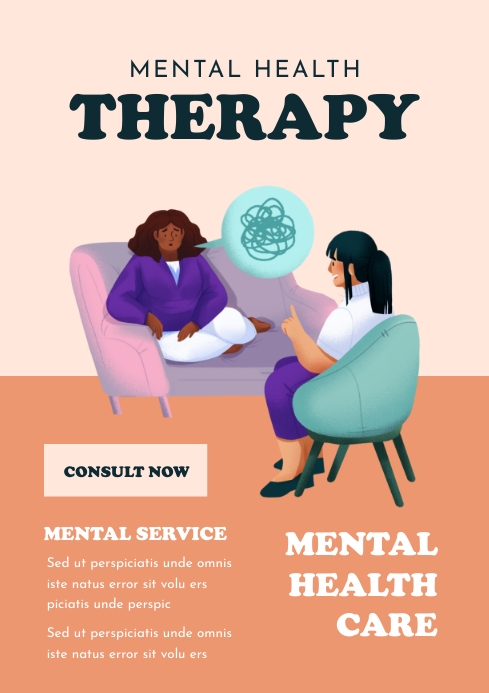The Relevance of Mental Health: a Deep Dive Into Therapy, Therapy, and Their Benefits
Psychological wellness substantially forms individual well-being, influencing actions, emotions, and thoughts. Therapy and treatment work as important avenues for recovery and personal growth. They offer organized assistance, aiding individuals navigate life's obstacles. Yet, many stay unaware of the details sorts of treatment available and their one-of-a-kind advantages. Recognizing these facets is necessary for any individual thinking about expert mental health and wellness assistance. What follows might illuminate courses to durability and satisfaction that several neglect.
Recognizing Mental Health And Wellness and Its Influence
Although psychological health and wellness is usually forgotten, it plays a crucial role in general well-being and day-to-day functioning. It encompasses emotional, emotional, and social variables that influence exactly how people think, really feel, and act. A person's mental wellness directly impacts their capability to manage anxiety, associate with others, and make options. Poor mental wellness can result in numerous issues, including anxiousness, anxiety, and difficulty in keeping partnerships, all of which can prevent personal and professional growth.Furthermore, mental health has far-ranging implications for physical health. Persistent stress and untreated psychological problems can add to different physical disorders, such as heart disease and compromised immune actions. Conversely, positive psychological health and wellness cultivates resilience, making it possible for individuals to manage life's challenges effectively. Understanding psychological health and wellness's importance is crucial for fostering encouraging atmospheres that promote emotional well-being, therefore boosting the top quality of life for individuals and neighborhoods alike
The Various Kinds Of Therapy and Therapy
In the domain of psychological health and wellness, numerous therapy and therapy types accommodate varied needs. Individual counseling techniques concentrate on personal concerns through individually sessions, while group therapy dynamics foster shared experiences and assistance among participants. Understanding these techniques is important for choosing the proper treatment for different obstacles.
Individual Counseling Strategies
Countless private counseling techniques exist, each developed to address details psychological health and wellness worries and deal with varying customer requirements. Cognitive Behavioral Therapy (CBT) concentrates on determining and changing unfavorable idea patterns, while Psychodynamic Treatment explores unconscious processes and past experiences. Humanistic Therapy stresses personal growth and self-actualization, fostering an encouraging setting. Interpersonal Therapy (IPT) targets relationship problems and communication patterns to boost psychological health. Furthermore, Acceptance and Commitment Therapy (ACT) motivates clients to accept their thoughts and sensations while devoting to personal worths. Each method supplies distinct strategies and ideologies, enabling specialists to customize their approaches to the individual, thereby improving the healing experience and promoting mental health recovery.
Group Therapy Dynamics
Team therapy dynamics incorporate various healing techniques that leverage the power of social relationships and shared experiences. This form of therapy typically includes varied teams, cultivating a secure atmosphere for individuals to share sensations and thoughts. Secret kinds of group therapy include support system, which give emotional support; process-oriented teams, concentrating on social interactions; and psychoeducational groups, targeted at giving knowledge about mental wellness issues. The characteristics within these teams can enhance self-awareness, as members frequently reflect on their habits in connection with others. In addition, team treatment promotes a sense of belonging, lowering feelings of isolation. Through shared narratives and collective analytical, individuals can create coping techniques and obtain insights, eventually contributing to private development and recovery.
The Role of Counseling in Mental Health
Therapy plays a vital duty in mental wellness by supplying different strategies customized to specific demands. These techniques provide expert assistance that can cause significant improvements in emotional well-being. Understanding the different types of therapy can help people make notified choices regarding their psychological wellness treatment.

Kinds of Counseling Strategies
While different counseling methods exist, each deals one-of-a-kind techniques and insights into psychological wellness therapy - Marriage Counselling. Amongst one of the most famous are cognitive-behavioral treatment (CBT), which concentrates on altering negative thought patterns; psychodynamic therapy, which discovers subconscious procedures and youth experiences; and humanistic techniques, emphasizing individual growth and self-actualization. Additionally, solution-focused quick therapy prioritizes finding services in the present as opposed to diving right into issues. Team treatment fosters community and shared experiences, while family therapy addresses relational characteristics within domestic structures. Each technique satisfies various needs, aligning with specific preferences, problems, and restorative objectives. Understanding these techniques assists customers make informed choices about their mental wellness journey and advertises effective therapy customized to their unique conditions
Benefits of Specialist Guidance
Countless individuals profit from professional assistance in handling their mental health and wellness difficulties. Counseling supplies a safe area for clients to explore their thoughts and feelings without judgment. This therapeutic environment promotes self-awareness, enabling people to determine patterns in their behavior and develop much healthier coping approaches. Expert guidance also gives accessibility to evidence-based strategies that can relieve signs of stress and anxiety, depression, and other psychological health and wellness concerns. Furthermore, therapists can help in setting sensible goals and supply support in attaining them, improving total well-being. The joint connection in between therapist and customer is crucial, as it advertises liability and urges personal development. Inevitably, professional guidance plays an essential role in steering psychological health journeys, causing improved psychological strength and life contentment.
Benefits of Therapy: Healing and Growth

Exactly how to Pick the Right Therapist or Counselor
Exactly how can one browse the typically overwhelming procedure of picking the right therapist or counselor? Determining personal demands is vital; individuals ought to consider their certain concerns, whether connection, stress and anxiety, or clinical depression difficulties. It is useful to research numerous healing techniques, such as cognitive-behavioral therapy or psychodynamic treatment, to locate a suitable match.Next, prospective customers ought to seek referrals from relied on resources or make use of on the internet directories. It is critical to evaluate specialists' credentials, including their education, licensing, and areas of expertise. Scheduling preliminary consultations can assist determine compatibility, allowing people to assess interaction styles and personal comfort.Finally, logistical variables, such as area, availability, and fees, ought to additionally be considered. By attentively evaluating these components, one can make a notified decision, ultimately cultivating a healing relationship that supports psychological health and individual development.
Getting Rid Of Preconception: Accepting Mental Wellness Support
While societal mindsets towards psychological health and wellness have actually advanced, preconception still presents a significant obstacle for many looking for assistance. This preconception often materializes as misunderstandings bordering mental disease, leading individuals to really feel shame or worry concerning their battles. Many individuals are reluctant to go after therapy or treatment because of concerns about being evaluated or classified. Overcoming this stigma is essential for promoting a supportive environment where people can freely discuss their psychological wellness needs.Communities and companies play an essential function in this change by promoting recognition and education and learning concerning psychological health problems. Campaigns that highlight individual stories can humanize these experiences, encouraging others to you can try this out seek aid without worry. As approval expands, people may feel extra encouraged to welcome psychological health and wellness support, acknowledging it as a crucial facet of total wellness. By taking down preconception, culture can cultivate a culture of understanding, empathy, and aggressive mental health and wellness treatment.
Methods for Preserving Mental Well-Being Outside of Treatment
Although treatment gives beneficial support, keeping mental health outside of sessions is just as crucial. Individuals can carry out a number of strategies to maintain their psychological wellness. Regular physical activity plays a crucial role, as workout advertises the release important link of endorphins, which enhance state of mind. Additionally, a well balanced diet regimen rich in nutrients can greatly influence psychological security and energy levels.Practicing mindfulness and reflection helps individuals take care of anxiety and create higher self-awareness. Developing a regular rest regimen is additionally fundamental, as high quality rest is critical for cognitive feature and emotional regulation.Engaging in social tasks promotes link and minimizes feelings of isolation. Pursuing leisure activities or rate of interests can offer a creative electrical outlet and boost self-worth. Finally, practicing and establishing reasonable objectives self-compassion permits people to cultivate durability. By incorporating these strategies into life, individuals can properly support their psychological well-being past treatment sessions.
Often Asked Inquiries

How Can I Inform if I Required Treatment?

Determining the requirement for treatment often entails acknowledging consistent feelings of unhappiness, stress and anxiety, or overwhelming anxiety. If everyday working comes to be difficult or coping mechanisms fail, seeking expert assistance might be an advantageous advance.
What Should I Anticipate in My First Therapy Session?
In the very first therapy session, individuals can anticipate an introduction, discussion of their factors for seeking assistance, and an overview of the specialist's strategy, producing a foundation for future conversations and establishing comfort in the restorative room.
Are Online Treatment Sessions as Effective as In-Person Ones?
Research indicates that online therapy sessions can be as efficient as in-person ones. Factors such as the specialist's credentials, customer interaction, and the therapeutic partnership substantially affect outcomes, regardless of the tool utilized.
Can Treatment Aid With Partnership Concerns?
Treatment can assist people in attending to partnership concerns by providing devices for communication, comprehending emotions, and dealing with conflicts. Couples Therapy. It advertises much healthier characteristics and motivates personal development, ultimately cultivating more powerful, much more meeting links in between companions
How Lengthy Does Treatment Commonly Last?
Therapy duration differs substantially based on individual demands and goals. Usually, sessions may last from a few weeks to a number of months, with some people involving in recurring treatment to attend to lasting concerns and personal development. Cognitive Behavior Therapy (CBT) focuses on identifying and changing negative idea patterns, while Psychodynamic Therapy discovers previous experiences and unconscious processes. Secret kinds of team treatment include assistance groups, which supply psychological support; process-oriented groups, concentrating on interpersonal interactions; and psychoeducational teams, aimed at presenting understanding about psychological health issues. Amongst the most noticeable are cognitive-behavioral therapy (CBT), which focuses on altering unfavorable idea patterns; psychodynamic treatment, which explores unconscious procedures and childhood years experiences; and humanistic strategies, stressing personal growth and self-actualization. Group therapy cultivates neighborhood and shared experiences, while family treatment addresses relational dynamics within familial structures. It is advantageous to research numerous restorative strategies, such as cognitive-behavioral therapy or psychodynamic treatment, to anchor locate a suitable match.Next, possible clients should seek references from trusted resources or utilize on-line directories.